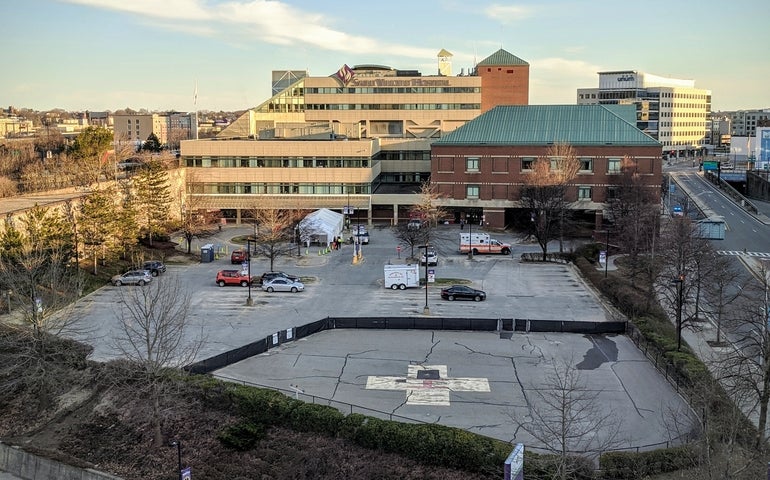The COVID-19 pandemic has disrupted the health care system, cut into provider revenues and could translate to longer-term shifts in care delivery, the state’s Health Policy Commission said Wednesday.
Figures presented at a virtual Health Policy Commission meeting, based on national industry reports, showed that hospital discharges, patient days, operating room minutes and emergency department visits all dropped in March 2020 compared to March 2019, resulting in a 14 percent reduction in revenue from inpatient care and a 19 percent reduction in outpatient revenue.
Those declines could be greater for April, when stay-at-home guidance and other social distancing restrictions were in effect for the whole month, said David Auerbach, the commission’s research director.
Doctor visits, where care tends to be “more scheduled and more elective,” have seen larger reductions — down 64 percent through April 12 — but about one in five of the “lost visits” have been filled through telehealth services, Auerbach said. Without telehealth, the decline in office visits would be closer to 80 percent.
“Major reductions in revenue are coming from all of that displaced and lost care,” Auerbach said at a meeting of the HPC’s Market Oversight and Transparency Committee.
State government has taken a variety of steps aimed at ensuring the health care system has the capacity to treat an unknown number of COVID-19 patients, including constructing field hospitals in different regions, temporarily banning elective procedures and making changes to how some in the medical field, like physician assistants and certain nurses, are allowed to practice.
Meanwhile, Gov. Charlie Baker has also recently been urging people to go to the hospital if they need care unrelated to COVID-19, stressing that the system can safely treat patients and that allowing a condition to go untreated can lead to worse outcomes.
As of Tuesday, 3,542 COVID-19 patients were hospitalized across Massachusetts, including 914 in intensive care units. Fifty-three percent of the state’s 18,200 hospital beds, including those at field hospitals, were unoccupied and available.
With revenue drops from avoided or displaced care, new revenues associated with COVID-19 care, federal and state support, and shifts in types of insurance coverage as newly jobless Massachusetts residents lose employer-sponsored plans, Auerbach said hospitals will experience a variety of financial impacts.
The effects will vary, he said, based on an individual hospital’s budgetary situation prior to the pandemic, payer mix, diversity of revenue streams and other factors.
Some of the displaced care, like knee replacement surgeries, will likely resume on the other side of the pandemic, with some waiting for patients as the health care system works through a reopening, Auerbach said.
“Some care that has been put off or reduced will probably not come back, and in some cases that’s not always a bad thing,” he said. “You can think of some kinds of low-value care or care that could be managed equally well at home or through medication versus an intervention or a surgical operation. Some substitution of inpatient care for telehealth visits will probably remain as people get used to that mode of care, which can be equally effective.”
Other potential longer-term impacts Auerbach highlighted included new, future costs related to COVID-19 treatments and vaccines, if they are developed, and higher demands for mental health and substance abuse services driven by the pandemic’s disruptions to the economy and daily life.
“The amount of post-traumatic stress that’s going to come out of this is going to be significant,” said Martin Cohen, who holds the seat on the HPC reserved for someone with expertise in behavioral health, substance use and mental health services. “We know from past mental health disaster work that it shows up three, four months after the disaster, and given the amount of loss — both death, illness, loss of jobs, loss of social interaction — I think it’s something that we have to pay attention to.”
Commission chair Stuart Altman suggested that HPC staff try to break down the impacts felt by different types of hospitals, saying he believes they will vary “substantially.”
“Our rural hospitals and many of our community hospitals have really taken the brunt of the reduction in admissions,” Altman said. “Most of the sickest patients, of course, have wound up in our major academic medical centers. Whether this will turn around after COVID has been reduced or not is going to be critical, because we as a commission have been very strong in our emphasis of trying to maintain a viable and active community hospital system, and the question is going to be whether the COVID experience really tests that.”

